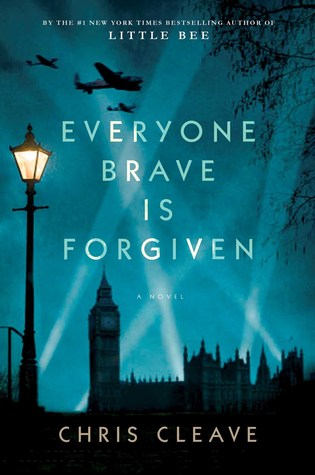EVERYONE BRAVE IS FORGIVEN

Everyone Brave is Forgivenis a book you should read if you would like to nourish your brain. Just about every sentence is deliciously well written.
The novel is set in London and Malta during World War II and addresses the themes of class, race, and the morality of war. Eighteen-year-old Mary, leaves finishing school “unfinished” and volunteers to help with the war effort. She envisions a glorious assignment but winds up teaching elementary school children, most of whom are shipped out into the countryside soon after she starts. She’s left with a class of misfits, who are rejected by society. Mary discovers that she loves teaching. She becomes attached to a black orphan child named Zachary.
Mary’s direct supervisor is twenty-three-year old Tom, who is a well-educated commoner. Despite their differences in class, Tom and Mary become smitten with one another. Mary’s best friend, Hilda, is a high society, boy-crazy, snob. Tom’s housemate and best friend, Alistair, restores art at the Tate. Tom and Mary hatch an ill-advised plan to set up Alistair and Hilda on a date. When all four go out to dinner, Mary and Alistair instantly are attracted to each other. However, both are too loyal to Tom to pursue a relationship. Throughout the novel, Alistair yearns for Mary and Mary yearns for Alistair, with neither one knowing exactly where the other stands. Early on in the novel, Alistair enlists and winds up on Malta, being battered by the Germans. Much of the plot of the novel is advanced via letters exchanged (and sometimes lost) between the main characters.
Cleave’s depiction of Zachary’s miserable life reveals the ugly underbelly of racism in 1940’s London. Mary tries to maintain a helpful relationship with the child, but is met with resistance on all sides.
A work of historical fiction, the book includes riveting details about the bombing of London and the Axis assault on Malta. Cleave draws from the experiences of both his maternal and paternal grandparents. The pacing is good. I pushed straight through to the end, never wanting to take a break, despite the gruesome descriptions of every day life in London and Malta. Cleave has a sentimental (but not gushing) way of telling his story that feels old fashioned and sweet, despite the horrors he is describing. The dialogue is clever and at times, so witty that I laughed out loud. My one complaint about the novel is that all of the characters, even the ten-year-old orphan, sounded much the same: sarcastic, brilliant, adroit masters of repartee. I wanted there to be bigger differences between the characters, in terms of tone and point of view.
However, that is a small complaint. The book was a joy to read. I loved the sad, but redemptive ending.
